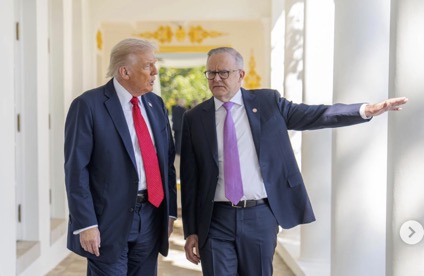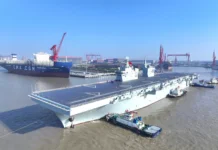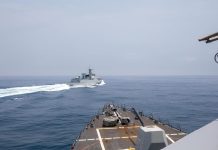
By Sam Roggeveen*
The Trump-Albanese summit at the White House is over. The Australian media is understandably pre-occupied with what the President said about Australia (and about Kevin Rudd). But the American press has latched onto Trump’s ex tempore remarks about Taiwan because, as Politico put it, “This is only the second time Trump has publicly spoken about Taiwan since taking office in January.” (From: The Interpreter. The Lowy Institute.)
Trump’s comments were notable for their optimism about the likelihood of a Chinese invasion of Taiwan: “I think we’ll be just fine with China. China doesn’t want to do that.” But what is that optimism based on? Here’s the key section of the Politico story:“First of all, the United States is the strongest military power in the world by far. It’s not even close,” Trump said, tamping down anxiety surrounding the next possible conflict. “We have the best equipment. We have the best of everything, and nobody’s going to mess with that. And I don’t see that at all with President Xi. I think we’re going to get along very well.”
To put it plainly, Trump is wrong about the military balance between the United States and China. In fact, he is dangerously wrong.
We all know that Trump is prone to changing his mind on a subject depending on who he talked to last. But we also know that he has a core set of beliefs – tariffs work, allies are grifters, autocratic strongman leaders are admirable – that no amount of evidence can shake. The concern should be that America’s vast military supremacy over China is, in Trump’s mind, another of those unexamined and unimpeachable truths, because he has said it before. In fact, he used almost the exact same phrase – “Nobody’s even close” – during a speech in Riyadh in May.
In the specific context of a fight over Taiwan, which is what Trump was talking about, I think it would be hard to find any military analyst who would support the claim that “It’s not even close”.
It’s important to stress here that this is not to question America’s status as comfortably the biggest military power in the world. The leading authority on this subject, the Stockholm International Peace Research Institute, estimatesthat in 2024, US military spending was US$994 billion (37% of the global total) while China’s was US$314 billion or 12% of all global spending.
But context is everything. And the military balance across the Taiwan Strait is far less favourable to the US than these headline figures suggest. As I wrote in Foreign Policy in September after the lavish Beijing military parade, China is now a global leader in military technology, and most of its effort is concentrated on weapons that can make a difference in a Taiwan scenario. It is particularly far ahead in missile technology, and a recent paper in the respected journal International Securityestimated that China’s missile force could destroy 45% of American combat aircraft capability in the Pacific in the first month of a war.
To reiterate, there is no doubting America’s global military supremacy. But in the specific context of a fight over Taiwan, which is what Trump was talking about, I think it would be hard to find any military analyst who would support the claim that “It’s not even close”. It absolutely is close, so close that the outcome of such a fight is now, at best, a toss-up.
Trump’s misplaced confidence about America’s military supremacy relative to China could produce disastrous decisions that affect us all. As Mark Twain said: “It ain’t what you don’t know that gets you into trouble. It’s what you know for sure that just ain’t so.”
*Sam Roggeveen is Program Director of the Lowy Institute’s International Security Program. He is the author of The Echidna Strategy: Australia’s Search for Power and Peace. Before joining the Lowy Institute, he was a senior strategic analyst in Australia’s peak intelligence agency, the Office of National Assessments.



